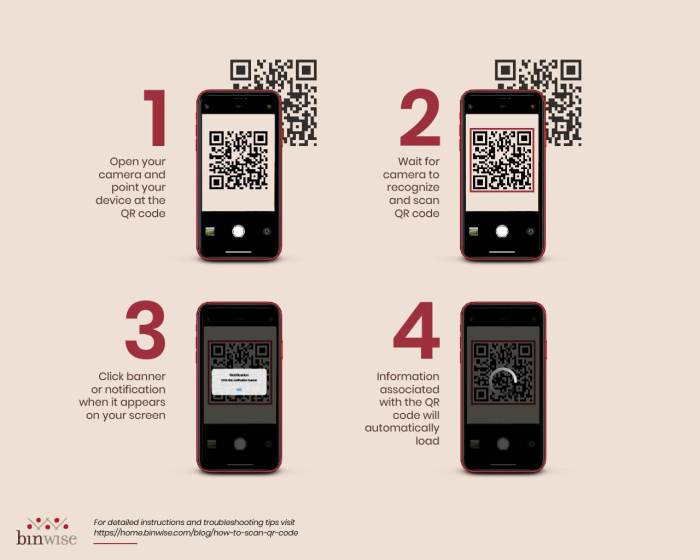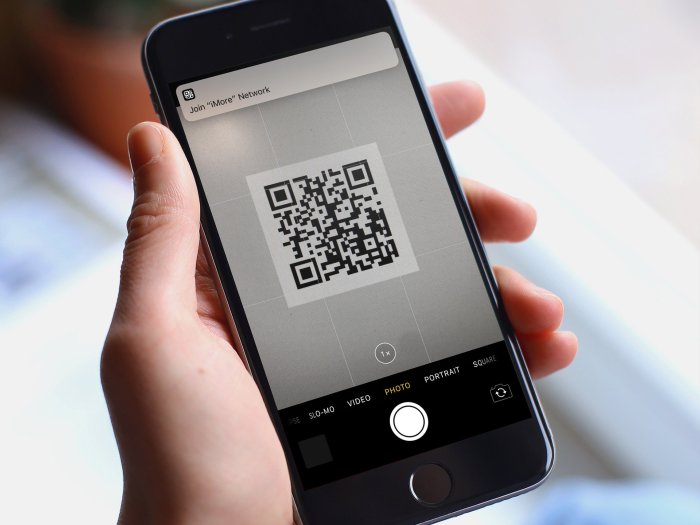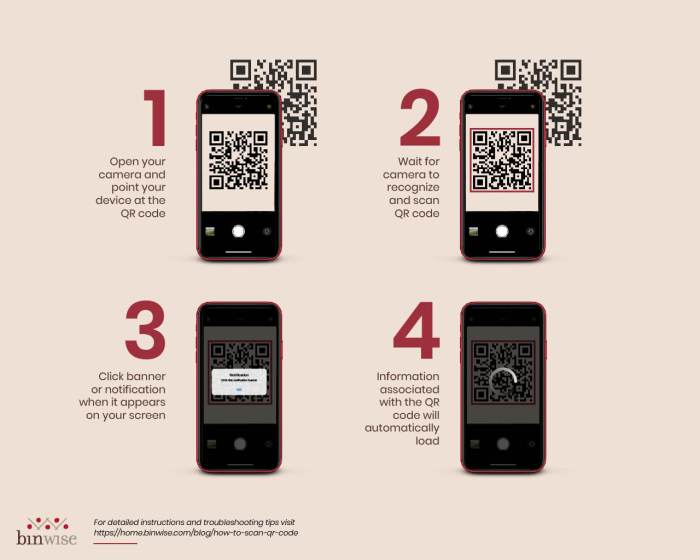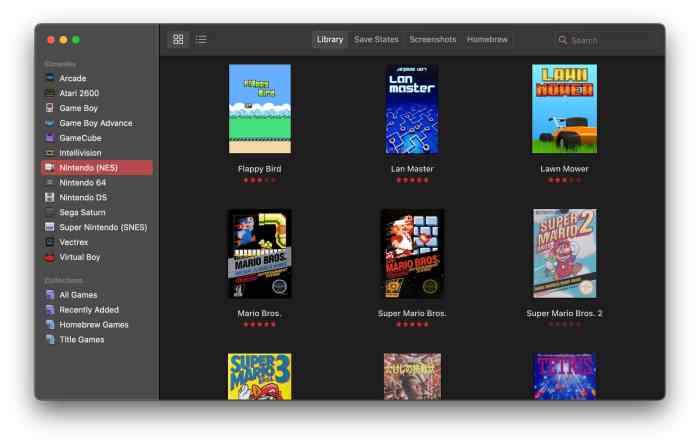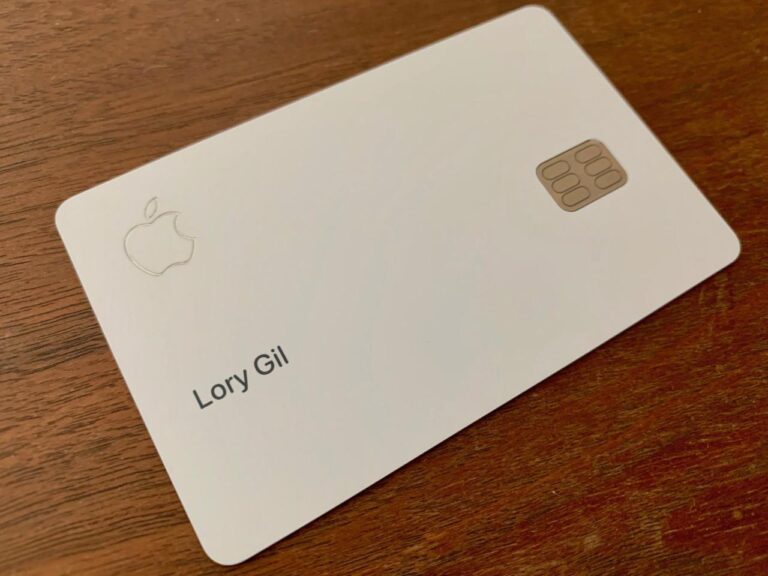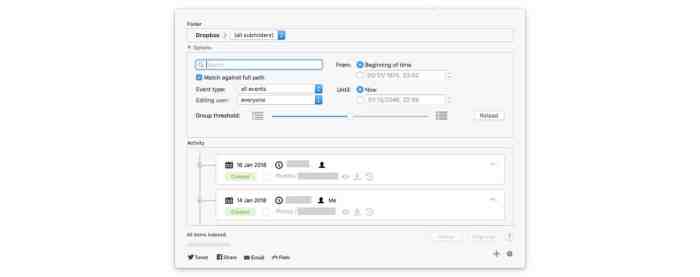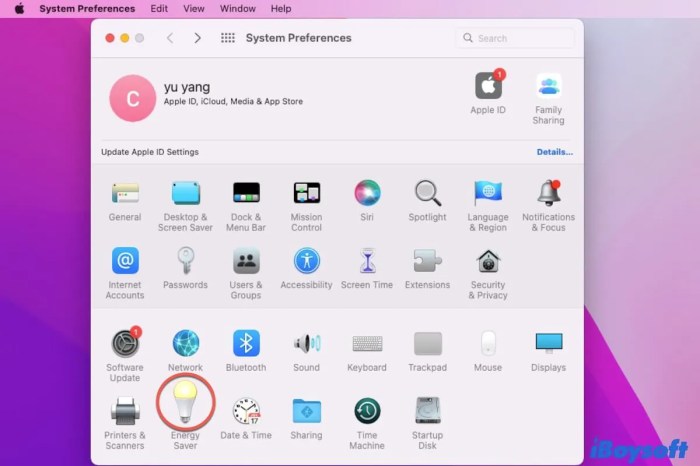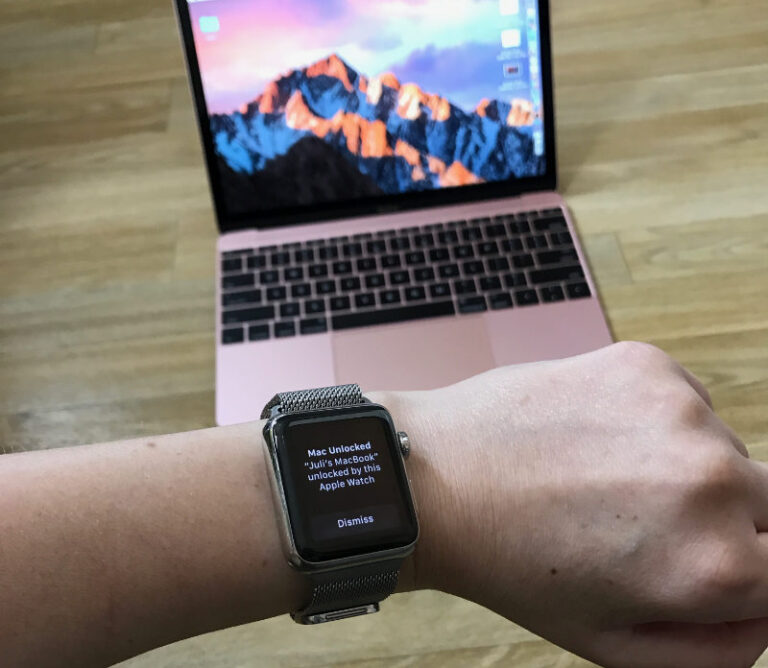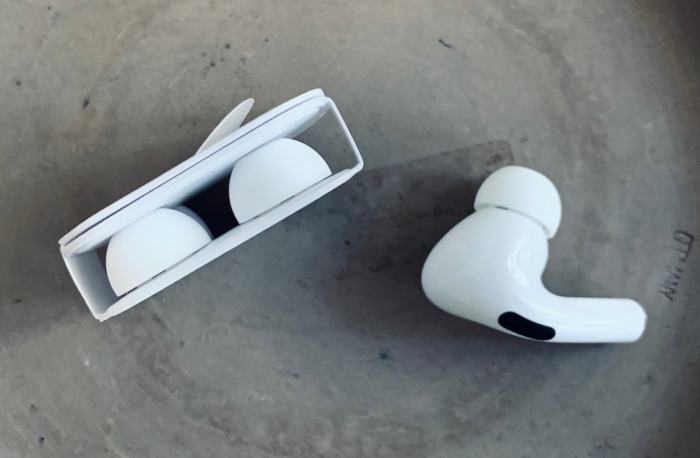How To Scan Qr Codes On Iphone
How to scan QR codes on iPhone? It’s easier than you think! These little squares have become a common sight, from restaurant menus to product packaging. But have you ever wondered how to unlock the information hidden within them?
With your iPhone, scanning QR codes is a breeze, opening up a world of possibilities.
Whether you’re looking to access a website, add a contact, or make a payment, your iPhone’s built-in camera can handle it all. But if you’re looking for more advanced features or a more user-friendly interface, there are also a plethora of third-party QR code scanner apps available.
Introduction to QR Codes
QR codes, short for Quick Response codes, are two-dimensional barcodes that can store a variety of information. They were invented in 1994 by the Japanese company Denso Wave as a way to track parts in automotive manufacturing. QR codes have become increasingly popular in recent years due to their versatility and ease of use.
They can be scanned by smartphones, tablets, and even some computers, making it easy to access information or complete tasks without typing in long URLs or entering data manually.
Benefits of Using QR Codes on iPhone
QR codes offer several advantages for iPhone users:
- Convenience:Scanning a QR code is much faster and easier than manually typing in a URL or other information.
- Versatility:QR codes can store a wide range of information, including URLs, contact information, text, and even files.
- Security:QR codes can be encrypted to protect sensitive information.
- Accessibility:QR codes can be used to make information more accessible to people with disabilities.
Examples of QR Code Usage in Everyday Life
QR codes are used in a wide range of applications, including:
- Marketing:Businesses use QR codes on product packaging, advertisements, and business cards to direct customers to websites, social media pages, or special promotions.
- Payment:Some retailers use QR codes to allow customers to make payments with their smartphones.
- Event Ticketing:QR codes are often used as digital tickets for events such as concerts and conferences.
- Education:Teachers can use QR codes to provide students with access to supplemental materials, videos, and online quizzes.
- Healthcare:Hospitals and clinics use QR codes to track patient information and provide access to medical records.
Built-in QR Code Scanner on iPhone
Your iPhone comes equipped with a built-in QR code scanner, making it super easy to access information and content just by pointing your camera at a QR code. No need to download separate apps!
Using the Built-in Camera App
The iPhone’s camera app is designed to automatically detect and scan QR codes. Simply open the Camera app and point it at the QR code.
The iPhone will automatically recognize the QR code and display a notification with a link to the corresponding website, contact information, or other content.
Automatic QR Code Detection
The camera app uses advanced image recognition technology to identify QR codes within its field of view. Once a QR code is detected, the iPhone will display a notification on the screen, letting you know that it’s ready to scan.
Manually Activating the QR Code Scanner
In cases where the automatic detection doesn’t work, you can manually activate the QR code scanner by tapping the “Scan QR Code” button. This button typically appears in the viewfinder of the camera app, usually at the bottom of the screen.
Third-Party QR Code Scanner Apps
While the built-in iPhone camera can scan QR codes, third-party apps offer additional features and functionalities that enhance the QR code scanning experience. These apps provide advanced capabilities, customization options, and a more comprehensive approach to interacting with QR codes.
Comparison of Popular Third-Party QR Code Scanner Apps
Several third-party QR code scanner apps are available on the App Store, each with its unique features and benefits. Here’s a comparison of some popular options:
- QR Code Reader by Scanova:This app offers a clean and simple interface, making it easy to scan QR codes. It supports various QR code formats, including those for websites, contact information, and social media profiles. The app also includes features like history tracking, allowing you to revisit previously scanned codes.
- QR Code Scanner by Kaspersky Lab:Kaspersky’s app prioritizes security by scanning QR codes for malicious links or content. It also offers additional features like QR code generation and the ability to save scanned data to your device.
- QR Code Reader Pro by TapMedia:This app boasts a wide range of features, including barcode scanning, QR code generation, and the ability to share scanned data. It also offers advanced settings, allowing you to customize the scanning experience.
- QR & Barcode Scanner by ScanLife:ScanLife is a comprehensive app that goes beyond basic QR code scanning. It offers features like product information retrieval, coupon scanning, and even the ability to pay bills using QR codes.
Benefits of Using Third-Party QR Code Scanner Apps
Third-party QR code scanner apps offer several advantages over the built-in iPhone camera scanner:
- Enhanced Security:Apps like Kaspersky’s QR Code Scanner prioritize security by scanning QR codes for potential threats, providing an extra layer of protection against malicious links or content.
- Advanced Features:Third-party apps often offer features not available in the built-in camera scanner, such as barcode scanning, QR code generation, and the ability to save scanned data.
- Customization:Many apps allow you to customize the scanning experience, including adjusting the scanning speed, enabling flashlight support, and setting up different actions for different QR code types.
- Integration with Other Apps:Some apps integrate with other apps on your device, allowing you to seamlessly share scanned data or perform specific actions based on the scanned information.
Examples of Enhanced QR Code Scanning Experiences
Here are some examples of how third-party QR code scanner apps can enhance the QR code scanning experience:
- Secure Payment Processing:Using a QR code scanner app like ScanLife, you can scan a QR code displayed at a merchant’s checkout counter to securely pay for your purchases. This eliminates the need to manually enter payment details, providing a faster and more convenient payment experience.
- Product Information Retrieval:ScanLife can scan barcodes and QR codes on products to provide detailed information about the product, including ingredients, nutritional facts, and customer reviews. This information can help you make informed purchasing decisions.
- Social Media Sharing:QR code scanner apps like QR Code Reader by Scanova can scan QR codes linked to social media profiles, allowing you to quickly follow or connect with the profile owner.
Scanning QR Codes for Different Purposes
QR codes are versatile tools that can be used for various purposes. You can use them to access websites, share contact information, make payments, and much more. Here’s how you can scan QR codes for different purposes using your iPhone.
Scanning QR Codes for Website Links
QR codes can be used to quickly access websites without manually typing the URL. To scan a QR code for a website link, simply open your iPhone’s camera app and point it at the code. The iPhone will automatically recognize the code and display a notification with the website link.
Tap on the notification to open the website in your browser.
Scanning QR Codes for Contact Information
QR codes can be used to share contact information, such as phone numbers, email addresses, and social media profiles. To scan a QR code for contact information, follow these steps:
- Open the Camera app on your iPhone.
- Point the camera at the QR code.
- The iPhone will automatically recognize the code and display a notification.
- Tap on the notification to view the contact information.
- You can then choose to add the contact to your contacts list.
Scanning QR Codes for Payment Transactions
QR codes are increasingly being used for contactless payments. Many businesses and merchants now accept payments through QR codes. To scan a QR code for a payment transaction, follow these steps:
- Open the Camera app on your iPhone.
- Point the camera at the QR code.
- The iPhone will automatically recognize the code and display a notification.
- Tap on the notification to open the payment app.
- Enter the amount you want to pay and confirm the transaction.
Other QR Code Functionalities
QR codes can be used for various other purposes, including:
Downloading apps
Some apps can be downloaded by scanning a QR code.
Connecting to Wi-Fi networks
Scanning QR codes on your iPhone is super easy, just open your camera app and point it at the code. You’ll get a notification with a link to the website or app the code is linked to. And if you need to record a quick note or idea, check out How to use the amazing new iOS 12 Voice Memos app.
It’s a great tool for capturing thoughts on the go, and it integrates seamlessly with your iPhone’s other features. Once you’ve got that audio memo, you can easily share it with others or add it to a note.
Speaking of sharing, once you’ve scanned a QR code, you can share the link with your friends or post it on social media.
QR codes can be used to share Wi-Fi network information, such as the network name and password.
Accessing digital tickets
Many events now use QR codes for digital tickets.
Accessing product information
QR codes can be used to provide information about products, such as ingredients, nutritional information, and reviews.
Troubleshooting QR Code Scanning Issues: How To Scan QR Codes On IPhone
It’s frustrating when your iPhone can’t scan a QR code. You might be tempted to throw your phone against the wall, but hold on! There are a few common issues that can prevent your iPhone from scanning QR codes correctly.
Let’s take a look at some common problems and how to solve them.
Troubleshooting QR Code Scanning Errors, How to scan QR codes on iPhone
There are a few common reasons why your iPhone might not be able to scan a QR code. Here’s a quick checklist of potential problems and solutions:
- The QR code is damaged or dirty.A damaged or dirty QR code can make it difficult for your iPhone to scan it properly. Try cleaning the QR code with a soft cloth or replacing it with a new one. You can also try using a QR code scanner app that’s designed to work with damaged or dirty QR codes.
- The QR code is too small or too far away.Your iPhone’s camera needs to be close enough to the QR code to scan it properly. If the QR code is too small or too far away, try moving closer or using a different QR code scanner app that’s designed to work with small QR codes.
- The lighting is too dim or too bright.Your iPhone’s camera needs adequate lighting to scan a QR code properly. If the lighting is too dim, try moving to a brighter location or using a flashlight to illuminate the QR code. If the lighting is too bright, try moving to a shadier location or using a sunshade to block out the direct sunlight.
- The QR code is at an angle.Your iPhone’s camera needs to be directly facing the QR code to scan it properly. If the QR code is at an angle, try adjusting the angle of your phone until the QR code is centered in the viewfinder.
- The QR code is distorted.A distorted QR code can make it difficult for your iPhone to scan it properly. This could be caused by a number of factors, such as printing the QR code on a curved surface or using a low-resolution image.
Scanning QR codes on your iPhone is super easy, just open your camera and point it at the code. But before you go around scanning everything, make sure you’re not giving away too much info. Check out this article on tweaking your iPhone’s location settings to keep your privacy tight.
Once you’ve got that sorted, go ahead and scan those QR codes to your heart’s content!
Try using a different QR code or a QR code scanner app that’s designed to work with distorted QR codes.
- The QR code is not a valid QR code.Some QR codes are not actually valid QR codes, which means they can’t be scanned. If you’re trying to scan a QR code that you know is valid, try using a different QR code scanner app or contacting the creator of the QR code to see if there’s a problem with the code itself.
Tips for Optimizing QR Code Scanning
Here are some tips to help you scan QR codes more effectively:
- Use a dedicated QR code scanner app.Many third-party QR code scanner apps are available on the App Store, and they often offer more features than the built-in scanner. Some apps can even scan damaged or distorted QR codes.
- Make sure your phone’s camera is clean.A dirty camera lens can affect the quality of your scans. Wipe the lens with a soft cloth before scanning a QR code.
- Hold your phone steady.Shaky hands can make it difficult to scan a QR code. Try holding your phone still while scanning.
- Be patient.It may take a few seconds for your iPhone to scan a QR code. Don’t give up too quickly.
Security Considerations for QR Code Scanning
QR codes can be a convenient way to access information and services, but they can also pose security risks. Malicious actors can create QR codes that redirect users to harmful websites or download malware onto their devices. It’s important to be aware of these risks and take precautions to protect yourself.
Identifying and Avoiding Malicious QR Codes
It’s crucial to be cautious when scanning QR codes, especially those from unknown sources. Here’s how to identify and avoid potentially malicious QR codes:
- Inspect the QR Code’s Appearance: Look for any distortions, unusual patterns, or inconsistencies in the QR code’s design. A legitimate QR code should have a clear and consistent pattern.
- Check the URL: If you’re scanning a QR code that directs you to a website, carefully examine the URL. Be wary of URLs that look suspicious, contain typos, or are overly complex.
- Beware of Unfamiliar QR Codes: If you encounter a QR code in a public place or from an unknown source, exercise caution. Avoid scanning QR codes if you’re unsure of their origin or purpose.
- Use a Reputable QR Code Scanner App: While the built-in iPhone scanner is generally reliable, some third-party QR code scanner apps offer additional security features, such as URL preview and malware detection.
Staying Safe While Scanning QR Codes
Here are some additional tips to help you stay safe while scanning QR codes:
- Don’t Scan QR Codes From Unreliable Sources: Avoid scanning QR codes from flyers, posters, or other sources that you don’t trust.
- Be Aware of Your Surroundings: If you’re scanning a QR code in a public place, be aware of your surroundings and ensure you’re not being observed.
- Enable Two-Factor Authentication: For accounts that you access through QR codes, enable two-factor authentication for an extra layer of security.
- Keep Your Software Updated: Regularly update your iPhone’s operating system and any third-party apps you use to scan QR codes. Updates often include security patches that can protect you from vulnerabilities.
Creating Your Own QR Codes
Creating your own QR codes can be a fun and useful way to share information, promote your business, or even add a touch of creativity to your projects. You can create QR codes that link to websites, display text, share contact information, or even store images and videos.
Online QR Code Generators
Online QR code generators are the easiest way to create your own QR codes. These tools provide a simple interface where you can input your desired information and generate a customized QR code.
- QRStuff:This popular generator offers a wide range of customization options, including different sizes, colors, and the ability to add logos. It also provides analytics to track QR code scans.
- QR Code Tiger:This free generator allows you to create basic QR codes and offers a variety of design templates. It also provides the option to track scans and download your QR code in various formats.
- GoQR.me:This generator is known for its user-friendly interface and offers a range of features, including the ability to create QR codes for social media profiles, events, and more. It also provides a free QR code generator for basic needs.
Types of Information Encoded in QR Codes
QR codes can store various types of information, allowing you to share a wide range of content.
- Website URLs:This is the most common type of information encoded in QR codes. QR codes can link to websites, blog posts, or specific pages on a website.
- Text:You can use QR codes to display text messages, including short descriptions, product information, or even entire articles.
- Contact Information:QR codes can store contact information, including phone numbers, email addresses, and social media profiles.
- Social Media Profiles:You can create QR codes that link directly to your social media profiles, making it easier for people to follow you on different platforms.
- Location:QR codes can store location information, allowing you to share the address of a business, event, or landmark.
- Email Addresses:You can create QR codes that open an email message with a pre-written subject line and body.
- Calendar Events:QR codes can store calendar event information, allowing users to add events to their calendars with a single scan.
- Images and Videos:Some QR code generators allow you to encode images and videos within the code, although this can increase the size of the code.
- App Downloads:QR codes can be used to direct users to download specific apps from app stores.
Customizing QR Code Design
While QR codes have a standard square shape with black and white patterns, you can customize their appearance to enhance their appeal.
- Colors:Some QR code generators allow you to change the color of the code, including the background and the squares.
- Logos:You can add a logo to your QR code to make it more recognizable and brand-specific.
- Shapes:While most QR codes are square, some generators allow you to create circular or other shaped codes.
- Frames:You can add a frame around your QR code to enhance its visual appeal and add a border.
Using QR Codes for Business and Marketing
QR codes have become a powerful tool for businesses and marketers looking to engage customers and drive conversions. By seamlessly bridging the gap between the physical and digital worlds, QR codes offer a convenient and interactive way to deliver valuable information, promotions, and experiences.
Benefits of QR Codes in Marketing
QR codes offer a multitude of benefits for businesses seeking to enhance their marketing campaigns and customer interactions. These benefits include:
- Increased Engagement:QR codes provide an interactive element that encourages customers to engage with marketing materials, leading to higher click-through rates and website visits. For example, a QR code on a product packaging can direct customers to a video showcasing the product’s features, while a QR code on a billboard can offer exclusive discounts or promotions.
- Improved Lead Generation:By linking QR codes to landing pages, businesses can capture valuable leads and build their email lists. Customers can easily scan a QR code and provide their contact information, allowing businesses to nurture potential customers and promote relevant offers.
- Enhanced Customer Experience:QR codes provide a seamless and convenient way for customers to access information, make purchases, or interact with a business. For instance, a QR code on a restaurant menu can allow customers to order food directly from their phones, while a QR code on a product display can provide detailed product information and customer reviews.
Scanning QR codes on your iPhone is super easy, just open your camera app and point it at the code. You can also use the dedicated QR code scanner in the Camera app, or download a third-party app for more features.
If you’re an AirPods Pro user, you might be interested in the beta firmware update that Apple has just released. You can check out the details on how to get it here. Once you’ve got that sorted, you can get back to scanning those QR codes!
- Cost-Effective Marketing:QR codes are a cost-effective marketing tool compared to traditional methods like print advertising or direct mail. They can be easily integrated into existing marketing materials and provide valuable insights into campaign performance through analytics platforms.
- Measurable Results:QR code scanning data provides valuable insights into campaign performance, allowing businesses to track engagement, conversion rates, and overall campaign effectiveness. This data can be used to optimize future marketing efforts and maximize return on investment.
Examples of Successful QR Code Implementations
Several successful examples demonstrate the effectiveness of QR codes in various business settings:
- Starbucks:Starbucks uses QR codes on its cups to allow customers to pay for their orders, earn rewards, and access personalized offers. This strategy has resulted in increased customer engagement and loyalty.
- Nike:Nike uses QR codes on its product tags to provide customers with detailed information about the product, including its origin, sustainability practices, and athlete testimonials. This enhances the customer experience and builds brand trust.
- Target:Target uses QR codes on its store signage to direct customers to product information, reviews, and in-store promotions. This provides a seamless and interactive shopping experience, leading to increased sales and customer satisfaction.
Future Trends in QR Code Technology
QR codes have evolved from simple barcodes into versatile tools that bridge the gap between the physical and digital worlds. Their adaptability has led to widespread adoption across various sectors, from marketing and commerce to education and healthcare. As technology continues to advance, QR codes are poised to become even more integrated into our daily lives, with exciting possibilities emerging on the horizon.
QR Codes and the Metaverse
The metaverse, a concept of interconnected virtual worlds, presents a unique opportunity for QR codes to play a significant role. QR codes can act as gateways to immersive experiences within the metaverse, enabling users to access virtual environments, interact with digital objects, and participate in virtual events.
Imagine scanning a QR code on a physical product to unlock an augmented reality (AR) version of that product within the metaverse, allowing users to explore its features in a more interactive way.
Outcome Summary
From unlocking hidden information to making payments, QR codes are transforming the way we interact with the world around us. With your iPhone, you’re equipped to easily navigate this exciting world of QR codes, unlocking new experiences and possibilities with every scan.
So, the next time you encounter a QR code, don’t hesitate – scan it and see where it takes you!
Key Questions Answered
How do I know if my iPhone can scan QR codes?
All iPhones with iOS 11 or later have a built-in QR code scanner.
What if the camera app doesn’t automatically detect the QR code?
You can manually activate the QR code scanner by tapping the “Scan QR Code” icon in the Camera app’s viewfinder.
Are third-party QR code scanner apps necessary?
The built-in camera app is usually sufficient, but third-party apps can offer additional features like history tracking, offline scanning, and enhanced security.

